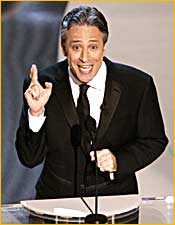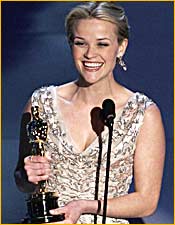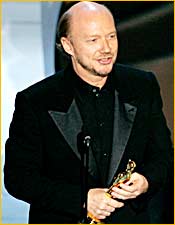 The Academy got me, again.
The Academy got me, again.This year, I kept telling myself, was different. This year was the year of the non-blockbuster, with the biggest film, Ang Lee's Brokeback Mountain, grossing less than $90 million. This year also featured some very deserving nominees, with the worst of the Best Film race still qualifying as very watchable indeed. This was going to be a good solid year, so what if the most commendable English language efforts -- David Cronenberg's A History Of Violence and Tommy Lee Jones' The Three Burials Of Melquiades Estrada -- were totally robbed when nominations were announced. Still, the films were interesting, and refreshingly free of A-list stars.
This might be a good thing when it comes to giving us an eclectic bunch of recommendations to savour later, but the Academy took things a bit far -- or should that be not far enough -- by ensuring lack of celebrity glamour. The Oscars, the biggest televised prize show in the world, have never been more of a yawn. This year's biggest names seemed to be Keira Knightley and George Clooney, and while every two-time Acting award winner in Oscar history seemed to be presenting a trophy, the ceremony was decidedly bereft of pizazz. Also, notably bereft of Tom Cruise, Angelina Jolie, Julia Roberts, Johnny Depp, et al -- the biggest movie stars in the world gave the party a miss. Jon Stewart managed to get a few zingers in, but his was not the laugh-out-loud kind of humour, and while better than the Chris Rock debacle, it was a strictly passable job as Oscar host. His otherwise extreme irreverence was considerably constrained; the tux must have been on too tight.
 Anyway, even as the boring, multiple-montaged evening dragged on, the awards were handed out with extreme predictability, which didn't seem like such a bad thing. Reese Witherspoon was incredible in Walk The Line, and deserves that trophy completely.
Anyway, even as the boring, multiple-montaged evening dragged on, the awards were handed out with extreme predictability, which didn't seem like such a bad thing. Reese Witherspoon was incredible in Walk The Line, and deserves that trophy completely.The Best Actor race, while in the bag for Philip Seymour Hoffman from the get go, boasted some incredible performances. That prize could equally strongly have gone to Heath Ledger for Brokeback Mountain, and -- if the Oscars were really about the Best in each category -- should have gone to David Strathairn for Good Night, And Good Luck, Clooney's extraordinary film that was totally shafted on the night. Whatever happened to the Academy's love for actors branching into direction, something Kevin Costner, Mel Gibson and Clint Eastwood have benefited greatly from in the past? George and Tommy Lee Jones ought to feel betrayed.
There are times when a year becomes about a film. Last year's award buzz, and all the pre-Oscar honours, were dominated entirely by Alexander Payne's superb Sideways, but all the prizes were inexplicably handed to Million Dollar Baby. 2005 has been the year of Brokeback Mountain, and giving it a half-cocked salute isn't enough.
Best Director is ideally an award that could have gone to Clooney, for his $8 million Good Night deserves as much encouragement as we throw at it: it's vital that films like that continue to be made, and that massive stars like George continue to make such terrific efforts. Of course, I knew that wasn't going to happen (though I did cross my fingers when Dustin Hoffman reached laughingly into the envelope) and as Ang Lee quoted Jack Twist on stage with the Best Director trophy, it was for an admirable job well done, and one can't complain at all. Or pretend to be outraged at another of the evening's obvious decisions.
Over the years, tragically, the Oscars have not been about the best films, but the acceptably best films and performances. So Wong Kar Wai, Eternal Sunshine Of The Spotless Mind and Garden State are all ignored, and some films critics refer to condescendingly as 'Oscar-friendly' enjoy a half-dozen nominations. Even amid the nominees, the names coming out of the Golden Envelope are upsetting. Consider these films: Chicago, Million Dollar Baby, American Beauty, Return Of The King, A Beautiful Mind, Gladiator. At the same time, think of these: Sideways, Traffic, The Aviator, Lost In Translation, The Insider, Chocolat, Moulin Rouge!, In The Bedroom. The first lot are the poster films, the winners. The latter bunch are the films really making a difference.
Earlier, the Oscars used to be about the sweep, one film usually picking up awards for Film and Director. But, as I discovered looking at the five times this hasn't happened in the last two decades, four out of these have been in the last few years. What does this signify? While there are occasional, supremely box-office driven aberrations like Titanic and Return Of The King, I fear the Oscars, like our desi award shows, have begun to play it safe, distributing their awards to all the 'major' nominees, spreading them thin so that while the Film goes home happy, the Director won't complain too much either. The result is in the newspapers today, in the advertisements promoting the Award-winning films. Pretty much every ad boasts 3 Oscars. Which was the biggest film of the 78th bunch of Academy Awards? Whichever you choose, they're too yellow to highlight one.
 And then came Jack Nicholson's 'wow' moment as he didn't try to hide his surprise: Crash won Best Film. It's not that Crash is a bad film -- it's not bad at all, just not in the top 3 among the 5 superlative nominees -- but that this shows extreme Oscar cowardice.
And then came Jack Nicholson's 'wow' moment as he didn't try to hide his surprise: Crash won Best Film. It's not that Crash is a bad film -- it's not bad at all, just not in the top 3 among the 5 superlative nominees -- but that this shows extreme Oscar cowardice.This is Brokeback's year, the powerful, brave film was a statement that needed to be trumpeted out loudly, a touching love story amid an absolute lack of acceptance. The Academy needed to reward Brokeback just to show that they were still capable of it, that they weren't a predictable bunch of biopic-worshipping stuffed penguins, that they could recognise cinematic courage and integrity, that a truly epochal film has to be raised to the light and be celebrated. They weren't, and my opinion -- I'm guessing I'm not alone -- of the passive, spineless members of the Academy has never been lower.
This is the year of the Mountain, and by claiming otherwise, the joke's on Uncle Oscar





